This year, the torrential rains in northeastern Nigeria have been more severe than in the previous two years, according to ReliefWeb, a humanitarian information service provided by the United Nations Office for the Coordination of Humanitarian Affairs. While this has provided much-needed relief to farmers, it has also led to unprecedented devastation in coastal communities.
The rains have triggered devastating floods across the region, causing widespread destruction in coastal communities and agricultural areas.
In mid-August, flooding in Miringa, a rural community in Biu local government area, Borno state, claimed the lives of two children, with homes and farmlands swept away.
Similar tragedies struck the towns of Kaga and Damasak in northern Borno, where homes, schools, farms, and businesses were either submerged or destroyed, displacing countless residents.
As the rains continued almost daily throughout August, heavy flooding last week caused the road linking Maiduguri and Bama to become submerged. The flooding washed away farms on both sides of the road, leaving travellers stranded and farmers unable to reach their fields, forced to watch their washed-out farms from a distance across the flooded plains.
Bukar Goni, a farmer, remarked that such flooding on the Bama-Maiduguri highway is rare. “This is unprecedented for us because this kind of flooding is not common. We hope this will not affect our crops,” he lamented.
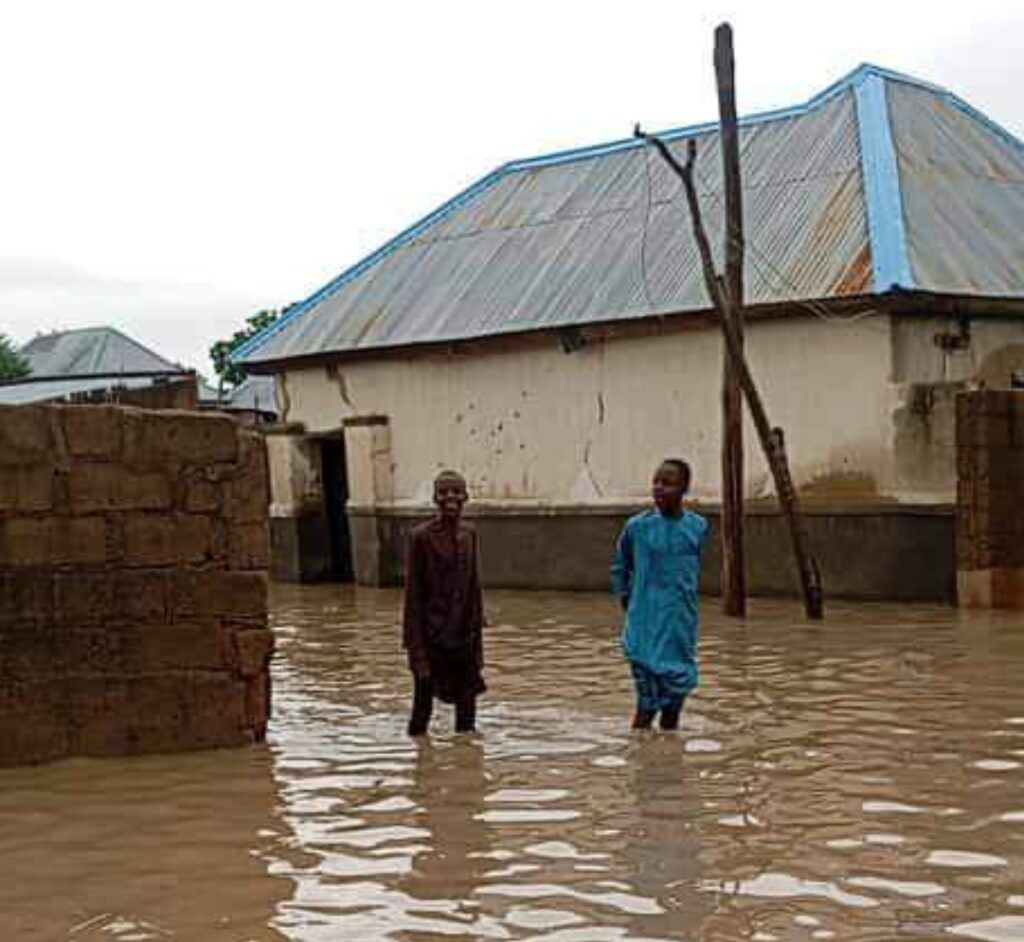
Similarly, residents of the historic town of Dikwa in the central part of Borno state were severely impacted by the widespread flooding, as the coastal village was inundated, leading to mass displacement and destruction of property.
“We need urgent help here in Dikwa,” said an unidentified resident in a viral social media video. “The flood water came through the farming area and washed over the graveyard before it got to the town; many houses, especially those built with clay, soaked and collapsed in the water, forcing people to evacuate to safety hurriedly. We need help.”
The Borno State Emergency Management Agency (Borno-SEMA) officials confirmed that many other towns and villages have been flooded but have yet to release data to back up the claims.
According to Muhammad Barkindo, the Director General of Borno-SEMA, the government is collating data on the situation around the state to provide relief support to the affected populace.
“We are trying to respond to the situations as the cases increase,” he said. “Two weeks ago, we took relief items to the victims of the flooding in Miringa, and the deputy governor led the team.”
In the neighbouring state of Adamawa, towns like Shuwa in the Madagali local government area also experienced significant flooding, resulting in loss of life and property. Based on HumAngle findings, at least six people died in the flooded communities around Madagali. The government also confirmed the fatalities, noting that over 14,000 people have been displaced as the floodwaters, which surged during a night of heavy rainfall, swept through the villages of Shuwa and Kirchinga in Madagali.
Additionally, the Limado Bridge, which connects Borno and Adamawa from the Gwoza axis, was swept away by the raging waters in Shuwa. This has forced drivers and commuters from Maiduguri to Yola, the Adamawa state capital, to detour through Yobe, Bauchi, and Gombe states.
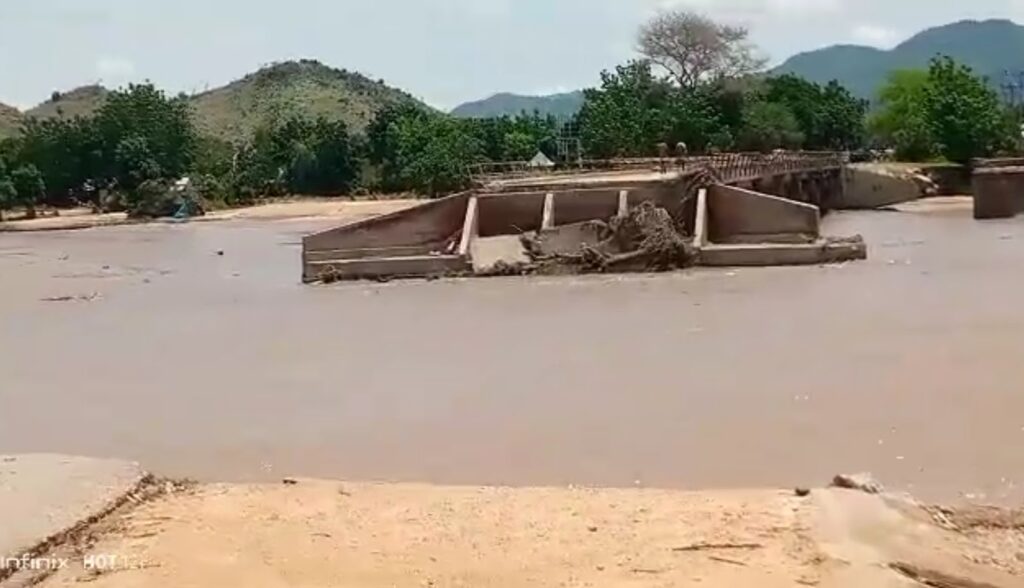
“Traveling to Yola, Mubi, or Askira-Uba via Gwoza is no longer feasible due to the collapse of the bridge in a village near Shuwa,” said Buba Adam, a commercial vehicle driver. “Now, we have to take longer routes through Yobe, then part of Bauchi, and finally through Gombe to reach Adamawa.”
The state government confirmed the six fatalities and reported that over 14,000 people have been displaced as the floodwaters, which surged during a night of heavy rainfall, swept through the villages of Shuwa and Kirchinga in Madagali.
Earlier this year, the Nigerian Meteorological Agency (NIMET) warned of possible flooding in many parts of Nigeria, especially the northeast. But the Adamawa state governor, Ahmadu Fintiri, who visited Madagali, argued that the warning was not early enough.
In Yobe state, the flooding has been merciless as roads linking major towns have been submerged in water, causing difficulties for commuters.
The road from Damaturu, the state capital, to Tarmuwa has been severely affected by excessive rain and flooding, resulting in the submersion of Jumbam, Baiyamari, Garin Alkali, and Gashua. This situation has caused a bridge to collapse.
Additionally, the towns of Potiskum, Nangere, Jakusko, parts of Bursari, and Gashua in the Bade Local Government Area, particularly around Tarajim village in Nangere, have also been impacted. Commuters are forced to seek alternative routes, while many remain stranded for days.
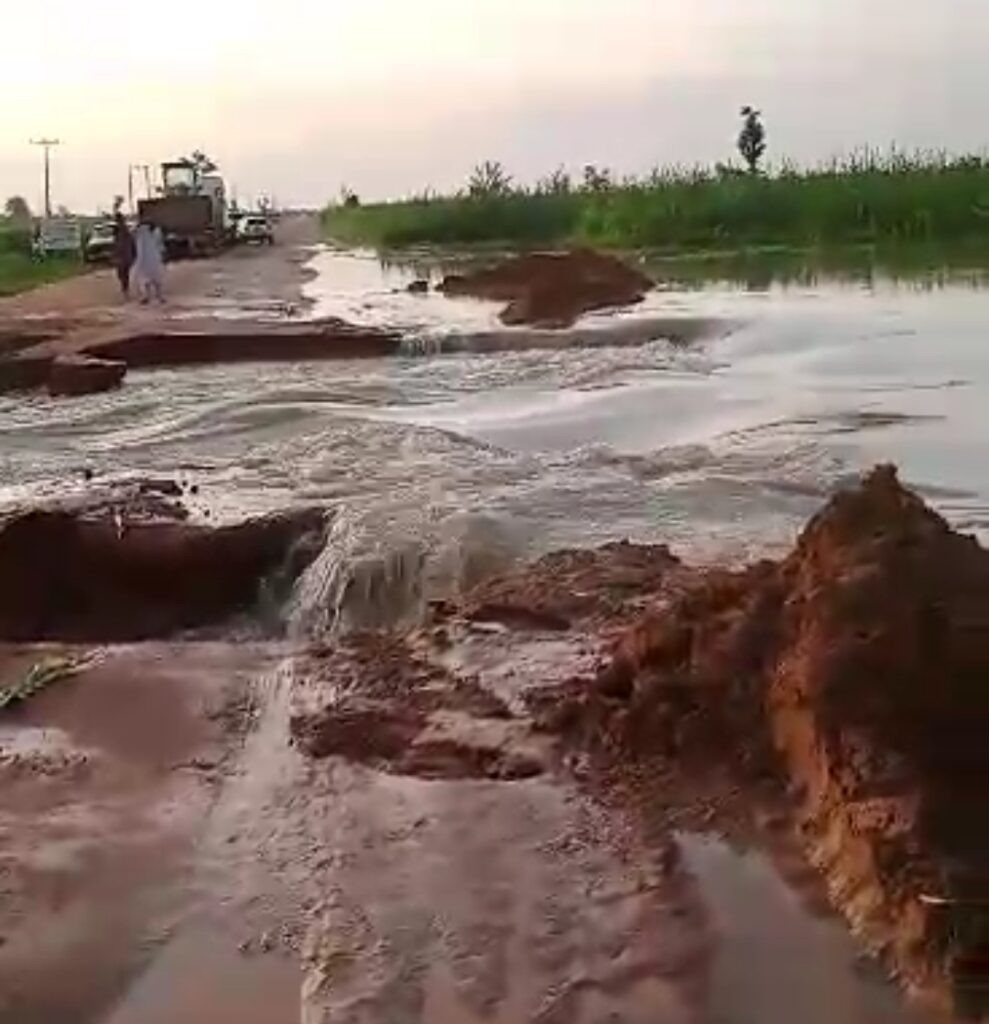
Mohammed Goje, the Executive Secretary of the Yobe State Emergency Management Agency (SEMA), said the state has initiated its first phase of flood response. This includes delivering essential food items and dignity kits to vulnerable individuals affected by the flooding in Potiskum, Bade, Yunusari, and Bursari starting Monday, Sept. 2.
Goje noted that while efforts to provide lifesaving support will commence soon, the route will be challenging, particularly for Bade, Yunusari, and Bursari. The response teams must navigate through Azare-Zaki-Gololo-Jakusko-Gashua/Yunusari or Baiyamari Bursari.
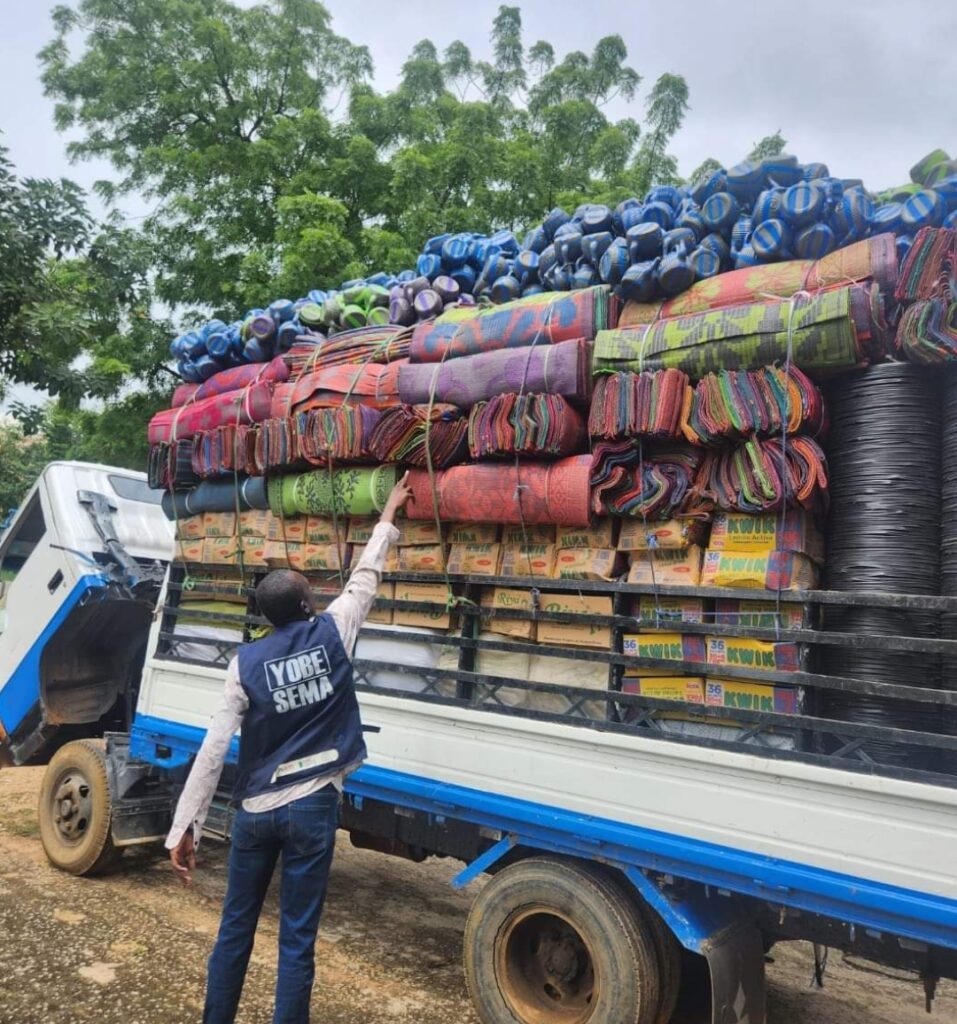
Alternative measures are being implemented to mobilise resources closer to the response sites.
“While the response is ongoing alongside assessments and medical support, we urge stakeholders to expedite validation processes and ensure compliance with necessary precautions in the previously identified red flag locations,” Goje stated.
“These are difficult times for our people in hard-to-reach areas. We will intensify our response efforts, as [the governor] has already increased resource mobilisation to support our communities.”
Things are dire in Taraba State, where at least 300 houses were submerged in the 2023 floods. Recently, a central bridge in Namai connecting the southern and northern parts of the state collapsed, causing significant traffic jams for travellers heading south.
However, the main concern for state officials is the anticipated release of water from Cameroon’s Lagdo Dam. Past releases have caused severe problems for residents of Northeast Nigeria. The state government established a flood control team across all 168 wards to quell the situation.
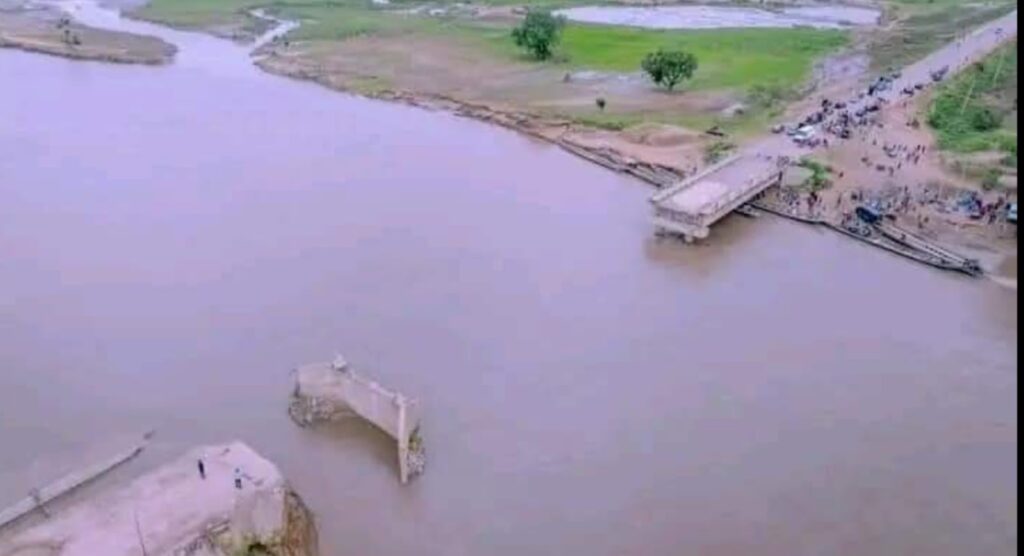
Taraba’s Governor Agbu Kefas said: “Our state faces significant challenges due to flooding, affecting the lives and livelihoods of many citizens. We are committed to finding lasting solutions and working closely with experts and communities to mitigate the impact of flooding.”
The government had also appealed to the Northeast Development Commission (NEDC) to help rebuild the collapsed bridge to ease the difficulty currently faced by travellers.
“Remain vigilant”: more risks.
Last week, Jimeta Bridge Hydro Station in Adamawa issued a second flood alert for the River Benue. Data from the authority warned that the river’s gauge height reached 5.17 meters, with an elevation of 156.336 meters above sea level and a discharge rate of 2,333 cubic meters per second, which raised concerns about potential flooding in the region.
The Authorities urged residents, including communities along its entire path, stretching from Wuro-Bokki on the Nigeria-Cameroon border to Ibbi in Taraba State, as well as major cities such as Makurdi, Idah, and Onitsha, extending down to the coastal areas to stay away from the banks of the Benue River.
Last year, the region experienced severe flooding, with peak water levels reaching 6.83 meters and discharges hitting 4,000 cubic meters per second on October 8, 2023. The Hydro Station authorities observed that the current rise in water levels has prompted fears of a similar situation unfolding this year.
The Hydrology Unit of the Upper Benue River Basin Development Authority in Yola said in a statement shared on social media that it “is actively monitoring the situation and will provide further updates as necessary.”
Residents are advised to remain vigilant and follow all safety recommendations to protect themselves and their property.
In Bauchi state, three people have died since mid-August this year as a result of severe flooding that affected approximately three local government areas. More than 1,000 homes have been destroyed by the floods, which have also disrupted the Maiduguri-Kano highway in Azare town.
Two weeks ago, this incident followed a major downpour that caused significant damage to another section of the federal highway connecting Kano to Maiduguri, specifically between Malori and Guskuri villages in the Katagum Local Government Area. The flooding created a large crater in the road, forcing motorists to seek alternative routes. Additionally, flooding cut off another road linking Gamawa and Udubo towns last week.
A tragic boat accident occurred on Sunday, Sept. 1, in the Zindiwa River, Bauchi state, leaving three people missing and seven others rescued. The boat, carrying ten passengers, capsized around late afternoon while attempting to cross the river. The incident was attributed to flooding that had severed the main road, forcing residents to rely on boats for transportation.
The Bauchi state government has since called on the federal government to assist in repairing the highways that connect Northwest and Northeast Nigeria.
Support Our Journalism
There are millions of ordinary people affected by conflict in Africa whose stories are missing in the mainstream media. HumAngle is determined to tell those challenging and under-reported stories, hoping that the people impacted by these conflicts will find the safety and security they deserve.
To ensure that we continue to provide public service coverage, we have a small favour to ask you. We want you to be part of our journalistic endeavour by contributing a token to us.
Your donation will further promote a robust, free, and independent media.


